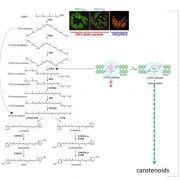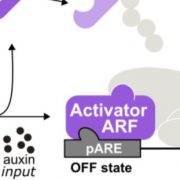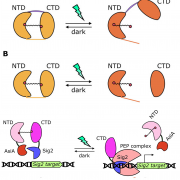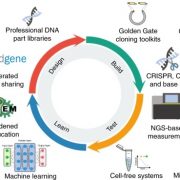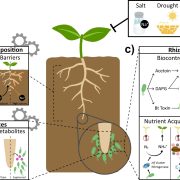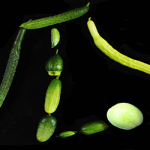Interviews with synthetic biologists: Guillaume Barbier
 Synthetic biology is a set of tools, a way of thinking, the integration of engineering principles into biological sciences, and potentially the biggest opportunity for advances in plant sciences since PCR. Yet many struggle to define it, and fewer still grasp its full potential.
Synthetic biology is a set of tools, a way of thinking, the integration of engineering principles into biological sciences, and potentially the biggest opportunity for advances in plant sciences since PCR. Yet many struggle to define it, and fewer still grasp its full potential.
Now, four early-career synthetic biologists have conducted a set of video interviews with leaders in the field of plant synthetic biology, in both academic and industrial arenas.
In the fifth of the series Interviews with Synthetic Biologists, Jenna Gallegos, a postdoc at Colorado State University, interviews Guillaume Barbier.
Guillaume Barbier is the Program Director of the nitrogen fixation program at Joyn Bio. Before this he was a Senior Scientist and Program Lead at Novozymes. He received his PhD from Michigan Technological University.
Joyn Bio is a joint venture between Ginkgo Bioworks and Leaps by Bayer, founded to bring synthetic biology to the challenges facing sustainability in agriculture. Our first project is to engineer microbes that can provide plants with biological nitrogen fertilizer, decreasing the environmental impact of agriculture.
Read more:
Bioengineers Aim to Break Big Ag’s Addiction to Fertilizers (IEEE Spectrum, 2018)
Bayer And Ginkgo Bioworks, A Startup, Aim To Make Crops Produce Their Own Nitrogen Fertilizer (Forbes, 2017)
Can you tell us about Joyn Bio?
JoynBio’s goal is to engineer microbes for agricultural solutions. We take microbes that are in the soil and that already interact with plants naturally, and we try to bring genetic traits to this microbe for the benefit of the plant.
JoynBio is a unique collaboration. Can you tell us about that?
It’s a joint venture between Bayer and Ginkgo Bioworks.
Can you tell us about your scientific journey and how it led to your being part of this venture?
I went to the Upper Peninsula of Michigan to work on environmental biotechnology at a small company called Nitrate Elimination Company. I thought I would be gone for six months, that was about 18 years ago. I worked for Novozyme for about 8 years. Novozyme is a Danish company that is known for producing a lot of industrial enzymes. I worked on metabolic engineering trying to make commodity compounds.
I started being involved with the BioAg Alliance, something done between Novozymes and Monsanto, about using microbes for agricultural purposes. That’s when I started to get really interested in that field. Removing chemicals from the field to instead put microbes I thought was a great idea. When the opportunity at JoynBio opened I felt that using synthetic biology for these microbial solutions would be great and interesting.
There’s a lot of overlap between metabolic engineering and synthetic biology. What for you sets synthetic biology apart?
I think metabolic engineering is more the end of what you want to do with synthetic biology, and to a point synthetic biology are the tools to get there.
What for you are the biggest challenges for plant synthetic biology?
We still have a lot of work to do in tool development, trying to get cheaper ways to synthesize DNA, having more output, more people who are synthesizing DNA, because right now it’s still a bottleneck.
Do you have any advice for people who are getting ready to make the transition from academia to industry?
What really surprised me when I made the switch was how industry could be organized and how you are part of the team. That can be a little surprising, because the work can be cut in different pieces. It’s always what people say, and it never makes much sense unless you experience it, but the teamwork is something extremely powerful, because you don’t have one brain, but you potentially have ten brains.
Jenna Gallegos joined the Peccoud Lab at Colorado State University as a postdoc in 2017. Jenna got her PhD in plant biotechnology at UC Davis where she studied gene expression in Arabidopsis. Her work as a postdoc focuses on high-throughput yeast genetics and developing tools for strain and sequence verification. In addition to skills in molecular biology, Jenna is an avid science communicator. She tweets, blogs, makes videos, writes science-based news articles, and serves as the news editor for the Oxford Journal Synthetic Biology. Before coming to CSU, Jenna interned as an ASPB-sponsored AAAS Mass Media Fellow at The Washington Post and on the BioDirect team within Monsanto’s Ag Productivity Innovations Organization in Woodland, CA. Follow Jenna on Twitter at @FoodBeerScience.
Previously in this series:
- Steven Burgess interviews Professor Jennifer Nemhauser, University of Washington.
- Steven Burgess interviews Michael Mendez, Renew Biopharma.
- Steven Burgess interviews Matthew Mattozzi, Conagen Inc.
- Jenna Gallegos inerviews Tobias Erb, Director, Max Planck Institute for Terrestrial Microbiology in Marburg


